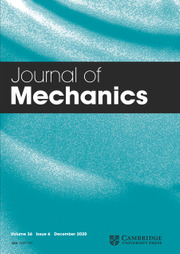Article contents
Homogenization Theory Applied to Unsaturated Solid-Liquid Mixture
Published online by Cambridge University Press: 08 May 2012
Abstract
In this study, we present theoretical derivation of seepage flow in unsaturated and static soil using Homogenization theory. The derivation started in the microscopic scale in the soil. The representative elementary volume (REV) in the soil is set to be one order larger than the scale of characteristic length of pore. Solids in the REV are assumed to be rigid and cohesionless. The liquid velocity in the pore is slow. By no-slip boundary condition on the solid boundary in REV, we could obtain the microscopic flow conditions. Using spatial ensemble average under the microscopic scale, we obtain the relation between water content, pressure head and velocities in macroscopic scale. This macroscopic averaged equation is validated to be equal to Richards' equation.
- Type
- Articles
- Information
- Copyright
- Copyright © The Society of Theoretical and Applied Mechanics, R.O.C. 2012
References
REFERENCES
- 2
- Cited by


